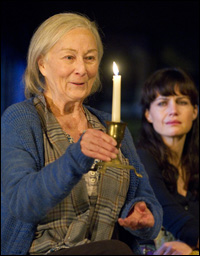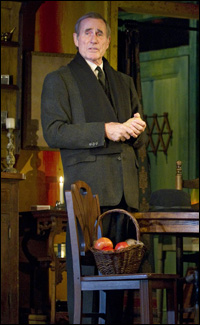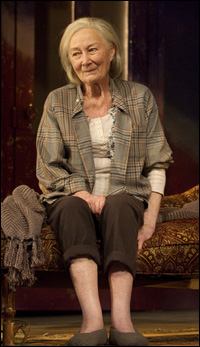
*
Broadway's Tony-winning Barnum, Jim Dale, has done his share of tightrope acts in his time on the Main Stem, but The Road to Mecca, which opens Jan. 17 at the American Airlines Theatre, takes him to a place he has never been before.
"This is not the comedy clown or eccentric dancer that people are used to seeing Jim Dale be," cautioned the sometime Scapino of his current role: Pastor Marius Byleveld, who comes up on the wrong side of the fence in a fight for artistic freedom that playwright Athol Fugard erected from his own old South African neighborhood.
Fugard himself played the good reverend when the opus first bowed Off-Broadway in 1988 — it was named that year's Best Foreign Play by The New York Drama Critics — and now Dale flies Byleveld's repressive, conservative colors on Broadway, in a production by Roundabout Theatre Company.
"He absolutely means well, but, of course, we need a villain in every piece," Dale explained. "Whether the villain stays the villain throughout the play — that's the question the author has to ask himself and then come up with his own answer." He added, "Actually, in playing the part, I find this guy is not the villain — just a gentle soul, a very sincere person — and that's what I hope will come across in the performance."
 |
||
| Rosemary Harris and Carla Gugino |
||
| photo by Joan Marcus |
Now "The Owl House," as it came to be called, is a national monument in the Karoo village of Nieu Bethesda in the Eastern Cape. Fugard was very aware of the artistic controversy encircling "Miss Helen" when he moved into the community in 1974, a whole decade before racial apartheid came to an end in South Africa. As he dramatizes the event, the preacher (in the guise of her protector) tries to persuade "Miss Helen" to put down her chisel and settle into a church-run rest home. Fortunately, she has a schoolteacher pal to rage about this toxic act of white racism and religious hypocrisy.
Carla Gugino, who plays the friend-in-deed championing the artistic rights of "Miss Helen," is one of Roundabout's more frequent Hollywood hires and, in her stage roles, has followed Elizabeth Taylor (Suddenly, Last Summer), Marilyn Monroe (After the Fall), Sophia Loren (Desire Under the Elms) and, now, Kathy Bates (albeit, in truth, Bates replaced the original — Amy Irving — and did the part in the 1991 film).
"This play is very much about somebody breaking the mold and how scary this is for other people," said Gugino. "Athol Fugard delves into the humanity of this in such a fearless, lyrical way. That, in itself, really attracted me to this project — that, and then to work with Rosemary Harris, who is one of the most extraordinary actresses alive and such a beautiful human being. Plus, neither of us can get through a single rehearsal with Jim without laughing hysterically — and we're doing a serious piece, too!"
 |
||
| Jim Dale |
||
| photo by Joan Marcus |
"We've known each other for donkey's years, but we've never worked together," Dale admitted. "She said, 'Would you do the reading — just the reading — of this?' I thought, 'Well, I'm doing nothing,' so we did the reading. Then, both she and the director said, 'Please, please, will you do it?' She's the one who convinced me — well, not convinced me — I just wanted to work with her. That's why I'm doing it."
The director is Gordon Edelstein, who's making much of this Mutual Admiration Society for the greater glory of Fugard. "Athol has written so many great plays, and, in my view, this is one of his masterpieces," Edelstein contended. "It's a play about the artistic imagination and the consequence of the artistic impulse. It's about love and friendship and courage and 'What are the values you should live your life for?'
"The story is simple. What we've come to know as 'an outside artist' — an artist who has never been to an art museum or read an art book — one day has visions to make art work in her tiny little town in the middle of nowhere. She creates art work that's thought idolatrous to this Dutch-reformed, Calvinist, small-town, rigid community.
"When Athol arrived, Helen was already a total recluse, so he never really had much encounter with her. The play is inspired by her life rather than a documentary of her life. I know in the community she was a real pariah and also had become really isolated. She was born and raised in that community and was a real old-fashioned Afrikaans housewife — until one day she wasn't, and they didn't like that very much."
 |
||
| Rosemary Harris |
||
| photo by Joan Marcus |
Not that Fugard has a lot more to add to his play. "When I moved into the village and acquired a house there, she was still alive and working as best as she could under the circumstances," he remembered. "She was afraid that she was going to lose everything then. About a year later, she died."
Her final battles were enough for him to conjure up The Road to Mecca and a passionate, stirring heroine. Yvonne Bryceland originated that role, reprised it Off-Broadway and managed to leave a permanent record of it via the 1991 movie version she did with Fugard and Bates the last year of her life.
"Yvonne was a formidable, legendary actress of the South African stage," Fugard trumpeted with no small measure of pride. "I collaborated with her for about 25 years. She was my lady for all the female roles I created."
Minus his muse, Fugard nevertheless counts himself in blessedly good-shape for this long-overdue Broadway revival. "This is a play," he said, "that has been waiting for a Rosemary Harris."









